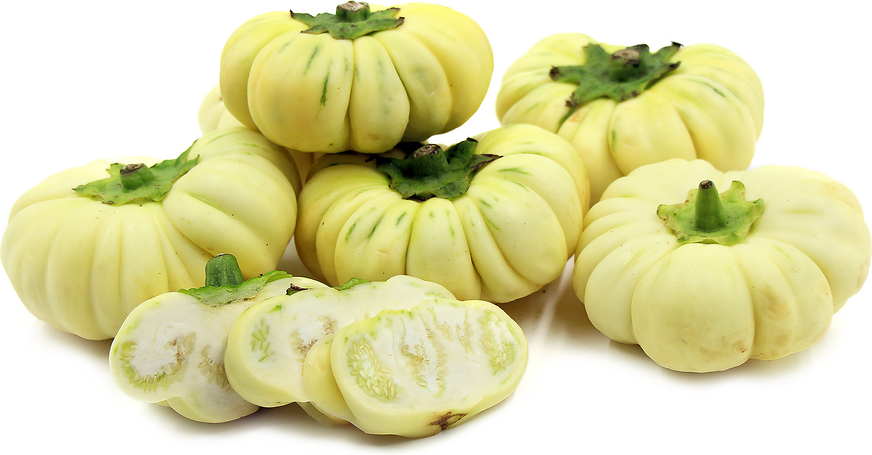


African Eggplant
Estimated Inventory, 10 lbs : 0
Description/Taste
African eggplants can be found in an assortment of sizes from a small, round egg shape to a depressed globular, pumpkin-like shape with deep furrows and depending on the variety; they range from 5-15 centimeters in diameter. The outer skin is shiny and smooth and can be yellow, green, white, or red, and the inner flesh is crunchy and pale yellow or ivory. African eggplants have a distinctly bitter taste that becomes more bitter as it ripens.
Seasons/Availability
African eggplants are available year-round with peak season in the late summer and fall.
Current Facts
African eggplants, botanically classified as Solanum aethiopicum, range in color and shape, depending upon the cultivar, and are divided into four groups categorized by size, shape, and method of use: Gilo, Shum, Kumba, and Aculeatum. African eggplants are commonly known as Mock Tomato, Bitter Tomato, Ethiopian nightshade, and Scarlet Eggplant.
Nutritional Value
African eggplants contain fiber, potassium and some beta-carotene, ascorbic acid, iron, and calcium.
Applications
African eggplants can be used in both raw and cooked applications. When raw, they can be sliced and eaten fresh, pickled, pureed into juice, or dried for later use. African eggplants can also be prepared by grilling, baking, broiling, and steaming. They are commonly stuffed or cooked in meat, vegetable, or rice dishes and can also be used as a pasta substitute. The leaves and young shoots of the African eggplant, containing most of the plant's nutritional value, can be used in soups, stews, sautés and even pickled. The inherent bitterness of the African eggplant is complimented by sweet flavors, rich proteins, and smoked meats. African eggplants pair well with curry or long braises in a simple blend of oil and garlic, nutty cheeses such as parmesan, meats such as ham, bacon, and sausage, caramelized onions or mushrooms, sweet potatoes, baby corn, tomatoes, red bell pepper, green beans, beans, and peanuts. African eggplants will keep up to week when stored whole in a cool and dry place.
Ethnic/Cultural Info
African eggplants have been a staple in African culture and cuisine. A popular item sold by street vendors, 80% of the total eggplant production in Africa comes from small family farms. African eggplants are consumed on a regular basis in households and are popularly used in curry dishes. Ancient folklore also mentions this fruit as a blessing of fertility, and African eggplants are often given as a gift during wedding and child naming ceremonies.
Geography/History
African eggplants are grown predominantly in Central and West Africa. They have since been introduced into the Caribbean and South America and are even grown in some of the warmer climates of southern Italy. Today, African eggplants are available at farmers markets and specialty grocers in Africa, South America, the Caribbean, the United States, and Europe.
Recipe Ideas
Recipes that include African Eggplant. One




